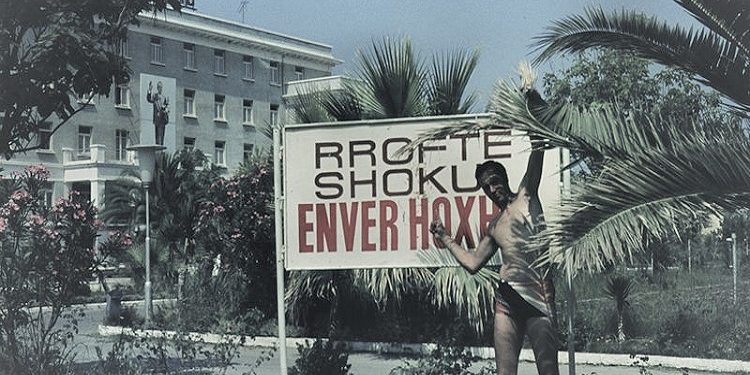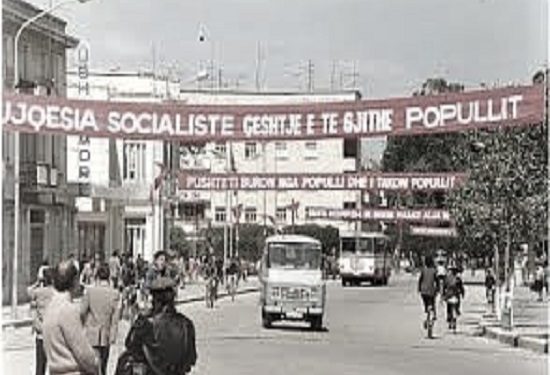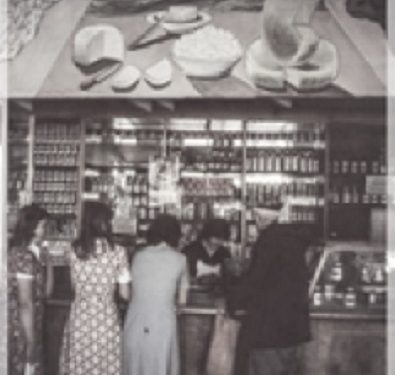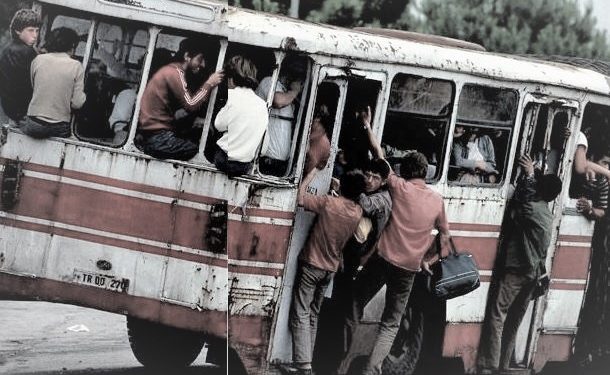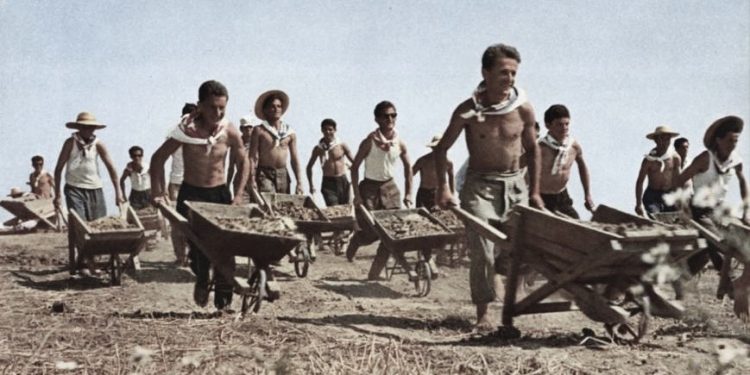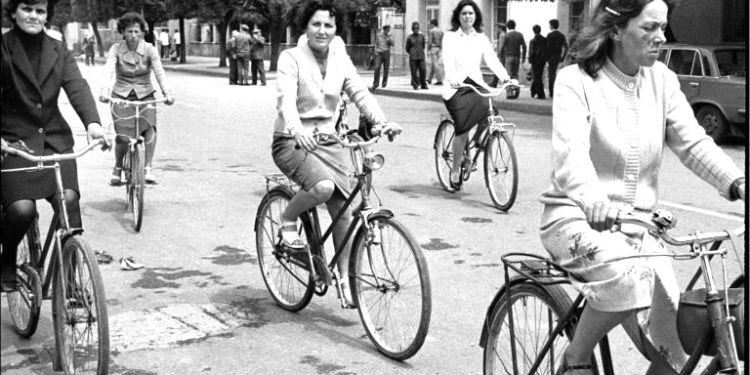-Karl Kaser: “I was a leftist, I expected to find real socialism, but I was disappointed, because Socialism in Albania, a nightmare, looking back, 50 years”!-
Second part
Memorie.al / He were 33 years old then. He had only heard about Albania. He was a leftist, but disappointed by the forms of socialism he had seen until then, he hoped to find the perfect version in Albania. In 1987, Karl Kaser, a young historian of Southeast Europe at the time, took advantage of an agreement between Albania and Austria, as well as the reluctance of all his colleagues, to come to the only communist, atheistic country in the world. Everything he saw during the days of his stay in Albania, he put in his diary. The socialism he found in Albania was a nightmare. He could not believe his eyes when he saw a country in extreme poverty. Badly dressed people, who didn’t dare to talk to him, because they were afraid of being punished, the lack of ethics, the hotels, the restaurants, the streets, the palaces… everything seemed like a step back in time…! According to Kaser, at least half a century later. And yet, Kaser returned in 1988, 1989… until 1992, every year for two to four weeks, closely watching the change of systems in Albania. His notes, taken more than 20 years ago, he has already published. “Albania, twenty years ago” – the memories of an Austrian historian – are included in the latest publication of the Center for Albanian Studies “Albania-Austria: Historiographic Reflection”. Today, not only the pedagogue of the University of Vienna, Karl Kaser, but also the Albanians themselves, have the opportunity to confront themselves with what Albania was 20 or so years ago.
Continues from last issue
September 1 to 19, 1988
I arrive again in Albania. This time they put me in Hotel “Dajti”, a significant improvement from Hotel “Tirana”. However, the secret police are much more present here. In fact, they are not able to camouflage their presence properly. I know I’m being watched, but who cares?! The construction of the “Enver Hoxha” mausoleum has begun. A big building. This takes a lot of money, an awful lot, for a poor country.
May 25, 19-6, June 1989
Excursion with over 40 students, from the University of Graz
The trip is organized by Alb-Tourism. The travel program is the usual one: To visit the best attractions of Albania. There are no signs of any political upheaval, even though Poland and Hungary already have multi-party systems. It seems that Albania has not been disturbed by these developments. Our companion is polite and fully in line with the Party’s ideological line. He never changes his blue nylon shirt for 11 days straight.
In Tirana, unexpectedly, one of the students suffers a heart attack. It’s almost midnight. We take a taxi to the hospital. A real nightmare. After the diagnosis, the doctor will make a needle with a syringe, whose agent, there is no doubt that he has used before. As soon as he sees such a thing, the student prefers to jump out of bed and pick himself up without the help of the needle.
(The excursion had long-term consequences. Three of my students decided to study the Albanian language and specialize in Albanian history and culture: Kurt Gostentchnigg, who has taught German at the University of Shkodra for years; Robert Pichler, who is completes his doctoral thesis on Albanian migration from Macedonia and Hubert Neuwirth, who worked in the field of development in Macedonia and Albania for the Austrian government for many years. All three of them defended their doctorates on Albanian topics).
Spring 1990
The political situation has started to boil. “Voice of the People” publishes an article by Dr. Ylli Popa, a well-known doctor and party activist, in two parts. The article is titled “40 Lost Years”. Many readers are shocked, others are stunned. There are also those who have persistently waited for such a signal, after the revolutions in other socialist countries. The author formulates thoughts that would have landed him in prison, until the end of days, just a few weeks ago.
Even an official statement, such as; “There is nothing to buy”, can be reason enough, for seven years in prison. Popa formulates a fundamental critique of the party and political developments during the last four decades. The political path followed so far has been completely wrong; the catastrophic situation in the economy is the best proof. In order to save Albania, a complete overhaul is necessary. The political system and institutions of public life must be democratized.
There could be no question of a mistake here. As far as is known, Popa has a close relationship with Ramiz Ali. Hard to think that these two articles are a random occurrence. After a few weeks, the fog clears: The party starts a general reform, in the only “currently socialist country in the world”! “Albanian Spring” has begun. For many, this is an unexpected step by the party, as there is still no mass organized opposition movement that will push the party into action. However, the situation seems clear: Despite official statements (Albania is different, etc.), the party must anticipate the consequences of the revolutions in Eastern Europe, especially the violent one in Romania, in December 1989.
The population is informed about developments in Romania through television. It is clear that the party elite are afraid of a similar spontaneous reaction in Albania; the political revolt is very likely to cause the same bloody results, as in Romania, due to the lack of political culture (an achievement of the Party). The second reason is the acute collapse of the economy and the growing poverty of a people, always poor, something even more obvious to a foreigner. The situation in rural areas is particularly depressing. In a country where the survival of the majority relies on agriculture, the lack of bread becomes part of daily restrictions. Industrial production continues to fall.
September 1990
Ramiz Alia, as the first leader of the Labor Party and the country’s president, visits a western country, America. It is clear that it is begging for financial support. Slogan; “No export, no import”, which is found everywhere in Albania, has already shown its disastrous consequences, especially among the new generation. Although officially, something forbidden until recently, everyone has had the opportunity to watch Italian televisions, with all the much-desired splendor and luxury that they offer. Compared to them, the Albanian market can only offer zero, or minus zero.
Thousands of young people are trying to flee the country. As far as I know, the Turkish Embassy is the only one that offers visas for Albanians. And many young people get Turkish visas, because they remember that this is also a rich country; most return disappointed. During the “Albanian Spring”, Albanians were no longer forbidden to speak with foreigners. This was a new discovery for both parties.
As I walk the streets of Tirana, many young Albanians approach me, who speak English and, on occasion, German. I have the impression that most of them want to test their foreign language skills. Certainly almost all of them ask me to support them for a visa to Austria. The Albanian youth, at least in Tirana, has definitively broken away from the communist past.
This disconnect is incredibly direct and radical. It is not necessary to ask them what they think about the political system. They speak for themselves on the matter; and almost everyone says the same thing. It is interesting that they do not show any interest in changing the political system; they just want to keep it to the West and become part of its consumerization.
Some of them suggest a Hitler-type dictator (because he made Germany rich!); others would gladly kill the politicians in hell. Why don’t they give us freedom?! Why should we be so poor, while Enver Hoxha’s children have luxurious houses all over the world? Everyone I talk to has negative judgments about the last four decades. They do not even remember a positive achievement of the party’s policies. It seems that the good times had ended, precisely with the arrival of the so-called liberation.
Albanian youth is not politically active. This political passivity constitutes the main barrier for the creation of a political opposition or an opposition culture. Due to the political patriarchy of the party, during these four decades, the reformation of the political system is only possible from the top down. The problem is that the masses are no longer interested in reforms. I think that, if the top-down reform will be successful, the Albanian society and the ALP will face a difficult period of transition.
Moreover, other things have happened that could not have been imagined half a year ago. Near the train station in Tirana, a private bar has opened, not at all attractive. Undoubtedly, a friend of mine and I cannot stay without enjoying the new sensation of private Albanian ownership. The quality of grape brandy is modest, not to be rude, and with that I close my activity for today.
Something else interesting happens: an increasingly serious security problem. When I return to the Tirana Hotel, the last night before I leave, the lobby is filled with locals, most of them from the countryside, and they all start asking me for favors. I finally make it to the room, only to find that two pairs of pants have flown off.
June 1991
Meanwhile, “Enver Hoxha” was forced to leave his eternal place in “Skënderbej” Square; likewise “Stalin”; a national strike has just ended; Prime Minister Fatos Nano has resigned and left it to Ylli Bufi, the former Minister of Provisions. He has formed a coalition government, consisting of the ALP and four opposition parties. The ALP will be renamed the “Socialist Party” and will be reformed. The economic system has collapsed. One of the external reasons is the dissolution of CONECON, which was Albania’s main trading partner. Supplying the population with basic goods is no longer guaranteed.
People have started to leave the country, most towards Italy and Greece. A mass exodus is expected. It seems that the introduction of the market economy is inevitable, but it will have the effect of a cold shower. What will be the consequences? Hard to imagine. It is certain that the rest of the social security system will fall apart; prices will rise; virtually all industry will be shut down; unemployment will swell to mass, etc., etc., not to mention the degeneration of public order.
All opposition parties support rapid changes towards a free market economy, with the exception of ALP, which calls for a slow transition and maintaining state control over a large part of the economy. Albania is not what it was a year ago. The collapse of the economic system has resulted in the abandonment of dogmas, considered until recently as eternal.
“The first atheist state in the world” and “the only existing socialist state”, now belong to history. The period of ideological experiments of this kind has ended irreversibly. In time, Albania will become a common European country. Many Albanians believe that it is easy to achieve such a thing. They also believe that the introduction of capitalist mechanisms will undoubtedly make them rich. They expect the end of poverty and the dawn of a new era of prosperity. What does the free market economy have to do with prosperity?!
August-September 1992
The first time with my car in Albania
On the Bari-Vlora ferry. Already in Bari it becomes clear that there are some dealers who are selling cars, or old “Mercedes” to be more precise (probably with car licenses) to Albanian migrant workers who join us on the ferry. Landing in Vlora is interesting. Not all drivers are able to drive from the ferry to the port. The road from Vlora to Tirana is in a poor condition. The massive increase in the number of cars, from zero to several thousand, has had its consequences. Tirana has changed radically.
One of the most peaceful places on the planet has turned into a noisy and dirty city. In front of a pedestrian zone, pedestrians have already thrown themselves behind the walls on the side of the roads. Skanderbeg Square is a real chaos. “Mercedes” is the new king of the roads. Having a car is not always an advantage in Tirana, or in other Albanian cities. Since it is dangerous to park and leave your car alone for more than 5 minutes, a new business has been born: car parks, guarded 24 hours by guards armed with “Kalashnikovs”. I am happy to pay the modest fee for this service.
Water, like electricity, is a rare commodity. Our hosts must be taken at four in the morning to collect the daily water ration. People are trying to adapt to the market economy, although not always in the right way. A short story may explain what I mean: there are many so-called “kinkaleri” kiosks, which are placed on the streets. They sell trinkets, anything that can be considered small.
Among them we also find beer. It’s almost noon and we want to have a beer. One of the “kinkaleri” kiosks sells beer! “What beer would you like, sir”? “What do you serve?” “What would you like-Czech, Austrian, Italian…”! “A Budweiser, please”. He finds it and taps it to the bare beer bottle, “Order your Budweiser, please.”
The city begins to grow, unrestrained, without any control!
General observations:
Working hours:
7 a.m. to 3 p.m., six days a week.
Holidays:
2 weeks a year, teachers have a month and a half.
Domestic travel:
Albanians, like me, need a permit to travel.
Salaries:
500 to 600 ALL. As much as a jacket or a good suit costs. A bottle of wine at the hotel costs 5 ALL.
Police:
It does not exist in the ordinary sense. The soldiers, who serve two years of compulsory service in the army, also perform the function of the police. There is no extra charge for this. Even the traffic police work in this way. Memorie.al




